Food in proper amount and composition is essential for the proper growth and development of children. Diet for children should be a well-balanced. This article gives information on what should be appropriate diet for children, amount of food and additional points to be kept in mind in case of pre-school and school children.
1. What is the appropriate diet for children ?
Food in proper amount and composition is essential for the proper growth and development of children. Diet for children should be a well-balanced containing adequate amount of proteins, fats, carbohydrates, vitamins and minerals.
The amount of calories and proteins recommended by I.C.M.R. (Indian council of Medical Research) for various age groups is given in the following table –
| Age in years | Calories per day | Proteins in grams per day |
|---|---|---|
| 2 to 3 | 1200 | 18 to 20 |
| 4 to 6 | 1500 | 22 |
| 7 to 9 | 1800 | 33 |
| 10 to 12 | 2100 | 40 |
| Adult | 2500 to 2800 | 45 to 55 |
Children require more calories and proteins per kg. of their weights as compared to adults. The composition of balanced diet in different age groups is given below.
For Vegetarians
| Classified Food Item | Food requirement in Grams per Day | |||
|---|---|---|---|---|
| 2 – 3 Yrs | 4 – 6 Yrs | 7 – 9 Yrs | 10 – 12 Yrs | |
| Cereals (Rice, wheat, Jowar etc.) | 175 | 270 | 320 | 420 |
| Pulses (Dals) | 35 | 35 | 40 | 45 |
| Leafy Vegetables | 40 | 50 | 50 | 50 |
| Other Vegetables | 20 | 30 | 50 | 50 |
| Roots / Tubers | 10 | 20 | 30 | 30 |
| Milk | 300 | 250 | 250 | 250 |
| Oils & Fats | 15 | 25 | 30 | 40 |
| Sugar – Jaggery | 30 | 40 | 45 | 45 |
These tables give general guidelines about diet for children. The individual requirements vary to some extent.
For Non-vegetarians
-
50% of the pulses can be replaced by 1 egg or 20 gms. of meat or fish in above table.
-
100% of pulses can be replaced by 2 eggs or 40 gms. of fish with 5 to 10 gms. of oil or ghee. Besides knowing the requirements in terms of grams and calories, other principles of dietetics given ahead should be followed.
2. Amount of diet
The growth rate during the second year of life drops. As a result the nutritional requirements also go down, hence the child is less interested in eating food. Forced feeding at this stage may lead to faulty feeding habits which will last for several years. The most natural reaction of a child is to rebel against coaxing and refuse the food.
By second year of life, most children take 3 meals in a day. However, each child can have his own schedule. Some children may keep taking a small amount of ‘snacks’ instead of a sumptuous meal at a time.
3. Additional points to be kept in mind in case of pre-school and school children
A. Square meals : All classes of food items should be provided in diet for children to avoid specific nutritional deficiency.
B. Education in dietetics : Every school child should be taught the importance of food for health and growth, so that he willingly participates in acquiring good eating habits rather than relishing what pleases his taste.
C. Sensitivity of a child to praise and criticism : The state of mind affects the food intake. Hence while eating, all sorts of embarrassing questions like asking about his studies and marks obtained in the examination, should be avoided. He should enjoy his food in good company and pleasant surroundings. You should let the child learn good habits by example rather than by formal explanation.
D. Snacks : Snacks between meals are desirable up to 4 to 5 years. Whether to have snacks or not should be left to the discretion of the child.
E. Dining Table : The child’s sitting position should be comfortable with appropriate height of the table and chair.
F. Serving Food : The food should be served in an attractive manner. The child should be encouraged to eat peacefully without any hurry and in a pleasant atmosphere, where a topic of family’s interest is being discussed.
G. Recipes : Instead of insisting that a child must eat a particular food item, the mother should come out with acceptable alternative recipes, which will be accepted by the child.
Reference : Sanatan Sanstha’s Holy text ‘Your child (1 to 12 years)’.


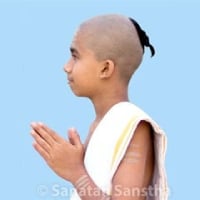 Sanskar Meaning and Definition
Sanskar Meaning and Definition Despite many births as a Human Being, why do Sanskar have to be made again ?
Despite many births as a Human Being, why do Sanskar have to be made again ?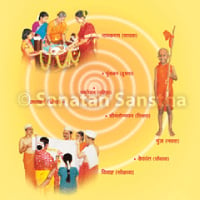 16 Sanskar – Importance and Objectives
16 Sanskar – Importance and Objectives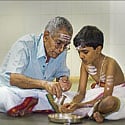 What is the aim of performing Sanskaras ?
What is the aim of performing Sanskaras ?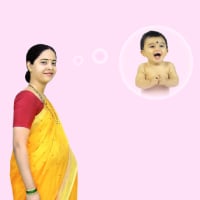 Garbh Sanskar (Pre-birth Sanskar)
Garbh Sanskar (Pre-birth Sanskar)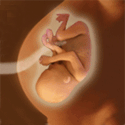 Discipline children before the child’s birth
Discipline children before the child’s birth